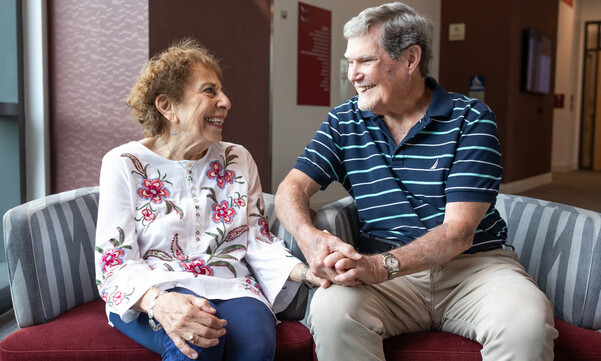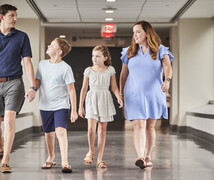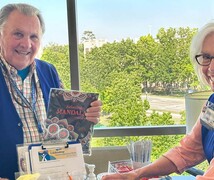When David Wilkie of Smithfield was diagnosed with Stage 4 lung cancer in October 2021, he and his wife, Jessica, didn’t know how they were going to tell their children. “You know they’re going to be scared,” David, 53, said. “Hell, we were scared.” Shortly after his diagnosis, Hannah Sasser, a certified child life specialist with the Duke Cancer Patient Support Program, reached out. She helped Maxwell, 9, and Eva, 8, understand what their mom and dad were going through. She also connected the family with KidsCan!, a monthly virtual support group for children whose parents have cancer.
“It made it a whole lot easier to talk to the kids about what’s going on,” Jessica said. “The people facilitating KidsCan! are doing a great job answering their questions. It takes a lot of pressure off us.”
A Safe Space for Kids to Have Hard Conversations
Normally parents don’t participate in the KidsCan! Zoom meetings, but David and Jessica were asked to stand by during their children’s first session to troubleshoot if technical issues arose. Things got serious right away.
“One of the kids announced his mom had passed away,” recalled Jessica. “It caught us off guard, but the child life specialists just ran with it. They talked about who the kids can talk to about their feelings or if they have questions. I thought when my kids heard that another kid’s parent had passed away that they wouldn’t go back. But we never get any arguments from our kids about participating.”
Age-Appropriate Sessions Educate Kids About Cancer
Each month, Sasser and her colleagues mail out packets explaining how participants like Max and Eva should prepare for the upcoming meeting. Kids are separated into age-appropriate groups so the child life specialists can engage them in activities like simple science experiments and interactive games. The goal is to educate the kids on their level about difficult topics, such as what cancer is, how its diagnosed and treated, side effects their parents may experience, feelings they may be having, and how their family lives are changing.
“Many times, kids create fantasies if they don’t know all the facts,” Sasser said. “I provide the facts so they can feel confident in their role in the family.”
Fostering Family Connections
The sessions are about more than education. Meeting kids going through the same experiences gives the children important social and emotional support too. “At school, they may not know a family whose parent has cancer,” Sasser said, “but in KidsCan! they do.”
In-person activities provide memory-making opportunities for the families together and with their newfound community.
KidsCan! families have gone to the Carolina Tiger Rescue Sanctuary in Pittsboro and a Duke basketball game. This summer, Max and Eva will attend Camp Kesem, a free sleepaway camp for children whose parents have cancer.
Thanks to the generous support of the Holt Brothers Foundation, the Wilkies won tickets to see an NC State football game and got to sit on the 50-yard line. “We’re die-hard State fans,” David said. “That was an amazing experience.”
More in-person opportunities are in the works. Soon, Max and Eva will go to the Duke Cancer Center in Durham where their dad receives his treatment every three weeks. “They haven’t seen any of that or met any of his doctors,” Jessica said. “They are very excited to participate in that.”
Helping Parents Parent
A Duke child life specialist meets with families following a new diagnosis to help them create a plan for educating the whole family about the cancer illness. Parents can participate in the parenting with cancer support group as well to cover challenging issues that arise.
Sometimes families don’t want to participate in KidsCan! right away or at all. That’s ok, Sasser said. “Everybody chooses different ways to meet their needs.”
What’s most important, she said, is for families to learn how to support, care for, and communicate with each other so they can maintain trusting relationships. “KidsCan! gives us a venue to maintain those relationships on a monthly basis,” she said.




